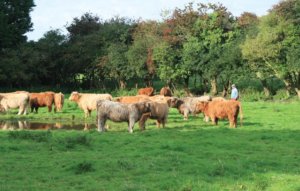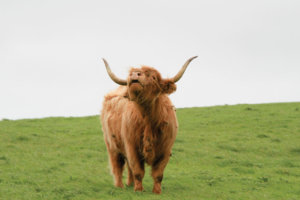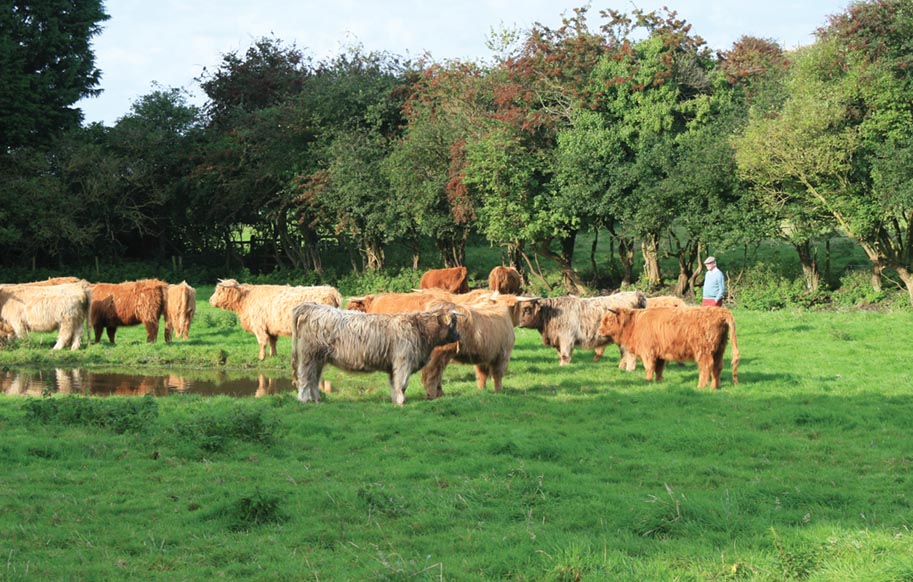 As one of the largest landowners on the Island, Michael Poland is also a major contributor to the increase in wildlife, improved island aesthetics and more commonly known for his introduction of ‘Champion’ Scottish Highland Cattle to our downlands.
As one of the largest landowners on the Island, Michael Poland is also a major contributor to the increase in wildlife, improved island aesthetics and more commonly known for his introduction of ‘Champion’ Scottish Highland Cattle to our downlands.
Tony Ridd visited Michael on his farm at Wroxall, to discover how these fascinating and relatively docile cows are helping achieve a balanced environment on Michael’s estate across the Isle of Wight. And, at the same time, marvel at the views that can be experienced whilst walking across his farm.
By the time this goes to press Michael and the Isle of Wight, will know the results of the first ‘RSPB Nature of Farming Awards’. For someone who has been involved in the islands countryside for many years, and whenever I see him, at various meetings he is always thanking someone. This is probably the biggest thank you/recognition that he could receive.
Michael’s first land acquisition on the Island, was in the early 1980’s, he now owns over 2200 acres of land across the island. From open downland, with fantastic views, to bluebell woodlands and all types of species rich grassland. There are over 15 miles of public rights of way across his land that he actively encourages people to use, although ‘dogs on leads’ are a must, for the sake of wildlife.
Looking after the countryside is all about ‘good house-keeping’, and Michael explained to me that one of his first tasks was to decide on an ‘estate plan’. Efficient farming, improving the quality of the land for wildlife (not using fertilisers) and increasing the landscape value, were all major parts of the plan.
One of the first tasks involved returning scrubby areas back to manageable land. He was introduced to Highland Cattle, and explains, ‘they love being in open ground and are happy to roam over large areas.’ Buying six at first he soon added to his herd when they proved their worth. They are surprisingly small when you first come across them, being lighter, they don’t poach the ground like other beef cattle. He is the proud breeder of two Champion bulls at Oban, and tells me there have only ever been three Oban Champion bulls bred outside of Scotland. He has also bred three other breed Champions at shows in the south. Michael attends the sales when looking to bring new blood lines to his herd taking expert advice when needed. The farm currently supports 170 cattle and produces about sixty calves a year. He keeps the best for breeding and showing with the remainder being sent for slaughter. The meat is highly sort after as they are grazed stress free on natural grass and is low in cholesterol and high in protein.
 Michael is dedicated about his cattle and farm. There are environmental surveys carried out each year, to ensure that the methods they employ, are moving the farm in the right direction. Entomology (butterflies and invertebrates), bats, birds and plants are all surveyed with the results being published on the ‘Wight Conservation’ Website. In the seven years that Michael has been carrying out surveys, he tells me about the marked increase in the diversity and number of wild flowers on his grass downland and through sympathetic hedge and woodland management a large increase in different bird species and population.
Michael is dedicated about his cattle and farm. There are environmental surveys carried out each year, to ensure that the methods they employ, are moving the farm in the right direction. Entomology (butterflies and invertebrates), bats, birds and plants are all surveyed with the results being published on the ‘Wight Conservation’ Website. In the seven years that Michael has been carrying out surveys, he tells me about the marked increase in the diversity and number of wild flowers on his grass downland and through sympathetic hedge and woodland management a large increase in different bird species and population.
Although the main man, Michael is quick to point out that he has a good team supporting his ideas. Barry Issacson, farm manager and his assistant, Shane, are employed in the every day running of the farm as are a number of part-time and seasonal workers. I spotted a large pile of pulled ragwort, Michael takes his responsibility very seriously and told me it had cost him over £8000 this year just to employ ‘ragwort pullers.’
To find out more about Michaels ideas and Wight Conservation check out www.wightconservation.co.uk. – Farming for Wildlife.



